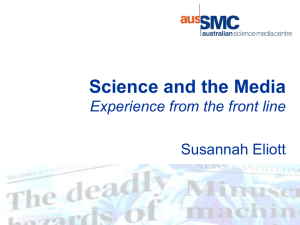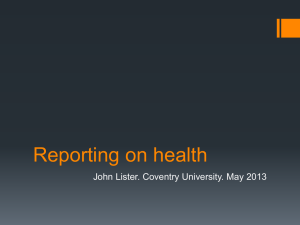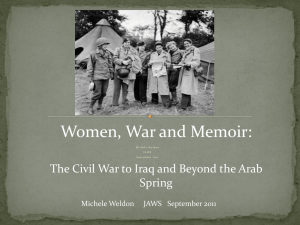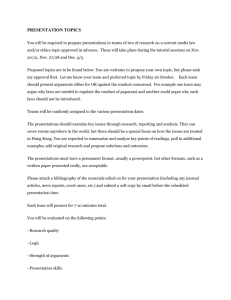Journalists can help improve quality of cancer
advertisement
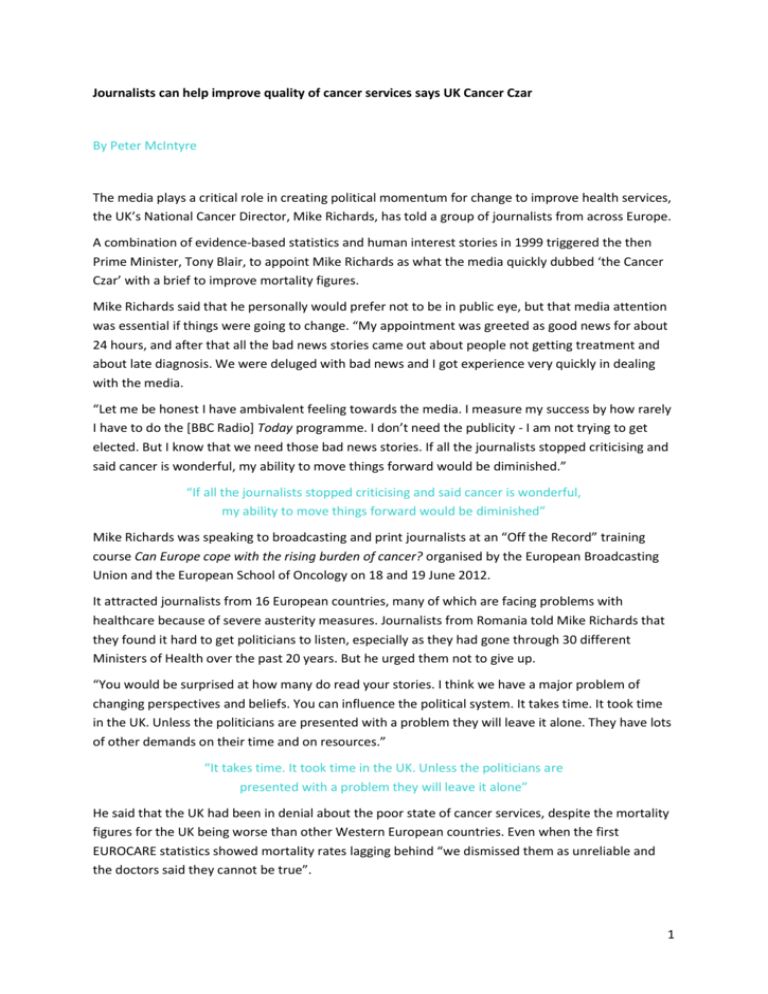
Journalists can help improve quality of cancer services says UK Cancer Czar By Peter McIntyre The media plays a critical role in creating political momentum for change to improve health services, the UK’s National Cancer Director, Mike Richards, has told a group of journalists from across Europe. A combination of evidence-based statistics and human interest stories in 1999 triggered the then Prime Minister, Tony Blair, to appoint Mike Richards as what the media quickly dubbed ‘the Cancer Czar’ with a brief to improve mortality figures. Mike Richards said that he personally would prefer not to be in public eye, but that media attention was essential if things were going to change. “My appointment was greeted as good news for about 24 hours, and after that all the bad news stories came out about people not getting treatment and about late diagnosis. We were deluged with bad news and I got experience very quickly in dealing with the media. “Let me be honest I have ambivalent feeling towards the media. I measure my success by how rarely I have to do the [BBC Radio] Today programme. I don’t need the publicity - I am not trying to get elected. But I know that we need those bad news stories. If all the journalists stopped criticising and said cancer is wonderful, my ability to move things forward would be diminished.” “If all the journalists stopped criticising and said cancer is wonderful, my ability to move things forward would be diminished” Mike Richards was speaking to broadcasting and print journalists at an “Off the Record” training course Can Europe cope with the rising burden of cancer? organised by the European Broadcasting Union and the European School of Oncology on 18 and 19 June 2012. It attracted journalists from 16 European countries, many of which are facing problems with healthcare because of severe austerity measures. Journalists from Romania told Mike Richards that they found it hard to get politicians to listen, especially as they had gone through 30 different Ministers of Health over the past 20 years. But he urged them not to give up. “You would be surprised at how many do read your stories. I think we have a major problem of changing perspectives and beliefs. You can influence the political system. It takes time. It took time in the UK. Unless the politicians are presented with a problem they will leave it alone. They have lots of other demands on their time and on resources.” “It takes time. It took time in the UK. Unless the politicians are presented with a problem they will leave it alone” He said that the UK had been in denial about the poor state of cancer services, despite the mortality figures for the UK being worse than other Western European countries. Even when the first EUROCARE statistics showed mortality rates lagging behind “we dismissed them as unreliable and the doctors said they cannot be true”. 1 Things began to change as cancer experts, cancer charities and patient groups became concerned. “Who was listening? Very importantly the media was listening and I am sure you all know that the power of the individual story backed up by statistics is very powerful.” He was at a meeting hosted by the health minister with women lobbying to get the drug Herceptin approved for breast cancer treatment and whose campaign had received high profile media coverage. One of the women told the minister that she was desperate for the drug and she had two brothers who were prepared to sell their houses so she could buy it. The Minister asked one of the other women about situation. She replied. “I am in exactly the same position but I don’t have any brothers.” Shortly afterwards health commissioners were told that they should provide the drug at public expense. “What influenced Tony Blair over a period of three, four or five years was you, the journalists, writing stories. The bad news was there and you could not ignore it, and journalism had a big part to play.” The UK has improved its record on cancer although it is still behind the leading countries. “What changed is that it became a political issue,” Mike Richards said. “Perhaps the single most important thing is building the community that says we must have better survival or outcomes for cancer. We need to get clinicians, academics managers, civil service, patients, politicians and charities pulling together.” Now UK cancer services are to use the power of information to reduce an estimated 10,000 lives a year that could be saved if people with cancer had earlier diagnosis and best practice treatment and care. Public campaigns are being run to give greater recognition of symptoms of lung cancer and of colorectal cancer, for which screening has also been introduced. Far too many patients arrive at hospital as emergencies, he said, when their symptoms could have led to earlier investigations. “Far too many patients arrive at hospital as emergencies, when their symptoms could have led to earlier investigations” The National Cancer Service is about to publish details of a survey of cancer patients’ experience of their hospital treatment, and they are also piloting a survey of treatment centres to see which have the best outcomes for bowel cancer surgery. Ultimately the aim is to link the patient experience to outcome data and to persuade hospitals to take ownership of the patient stories. “Some of our most famous teaching hospitals, where clinical outcome and survival are quite good, have very poor patient experience. We want the best cancer intelligence system in the world because we think this will drive improvements in outcomes. “ Mike Richards said he had drastically underestimated how long it would take to bring about change. “I told Tony Blair I thought it would take five years. I was completely wrong, after ten years we have still not got there. The job will never be finished and someone else may need to do it.” But he said that multidisciplinary teams were now well accepted in the UK as the best way of treating cancer and the risk of patients getting the wrong or bad treatment was now much lower. A recent training programme to increase the number of surgeons who use laparoscopic (keyhole) surgery to treat cancer patients was found to have paid for itself in reducing the complication rate. 2 The focus is now on earlier diagnosis and on the quality of care after treatment for long-term survivors. Tit Albreht, from the Slovenian Institute of Public Health, led a working group to survey national cancer plans across Europe, to be published later this year. He said that the media had a role to play in removing an aura of shame that exists in some countries around cancer. In Slovenia the media had helped to raise the response rate for colorectal cancer screening from 28% to 71%, so it is now amongst the best in Europe. In all, about 800 stories had been written and he recalled one about a man who had delayed sending in his stool sample, but had then spoken out after screening discovered cancerous polyps which were then removed. In Slovenia the media had helped to raise the response rate for colorectal cancer screening from 28% to 71%, so it is now amongst the best in Europe. Olaf Steenfadt, project manager for the EBU, who chaired the sessions, asked whether the review of cancer plans would recommend media strategies to be included. Tit Albreht told him, “We will definitely work on it. It is not part of the current template, but it is extremely important.” During the training event journalists received briefings from cancer experts about the latest statistics and discussed ways in which they can broadcast and write more clearly about cancer prevention, screening, treatment and the social issues that surround cancer. Anna Wagstaff, assistant editor of the ESO journal, Cancer World, said, “Journalists have spoken about the fatigue of only writing about individual cases and even getting involved in fundraising.” She said that if journalists could highlight the need for a good cancer plan and policies it would encourage young cancer doctors who were demoralised by spending cuts in lower income countries to stay and work to improve services. 3




